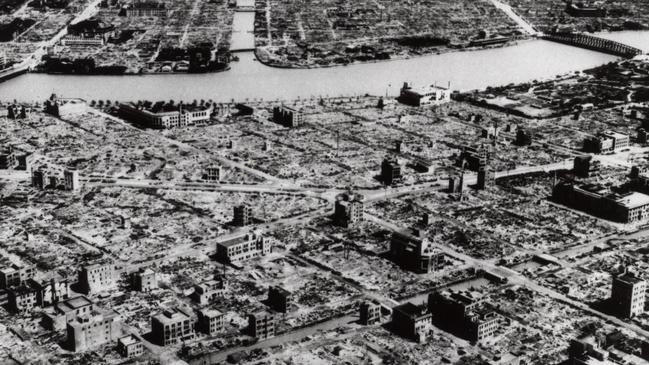
The real question, however, is what follows from that assertion. And it is at that point that the government’s incessant equivocation descends into an unacceptable moral equivalence.
It is, in effect, not merely the loss of innocent life that counts; it is also the circumstances in which it occurs. Thus, the fact that more than a million civilians were killed by Allied bombing during the Second World War, while millions of innocent Jews were being slaughtered by the Nazis, scarcely means that the Allies were no better than their adversaries.
There are, no doubt, debates to be had about which Allied tactics were effective and which were not. But it is clear that the Nazis deliberately set out to butcher their innocent victims while the Allies, even when they incinerated entire cities, were not motivated by a desire to exterminate those cities’ populations. Their goal was to defeat the German and Japanese regimes whose very existence made peace impossible.
The Allies certainly knew that their actions were causing countless civilian deaths. But they believed, for good reason, that the moral responsibility for those deaths lay with the murderous regimes they were fighting.

And they also believed that it was not solely the people of the Allied countries who would benefit from their enemies’ defeat. Innocent German and Japanese lives would be saved too – saved from an ideology and a political domination so monstrous, so degrading even to those who might survive, that the consequences of its final victory were beyond imagining.
As a result, the moral imperative was not to immediately stop the bloodletting; it was to win the war. This was hardly a pub brawl between equally reprehensible louts, who should be separated and forced to calm down. It was a conflict, fought at the cost of 30 million lives, about which values would ultimately prevail – the values of barbarism or those of civilisation.
That is why the Allies adamantly rejected the proposals, made with increasing frequency by the Axis powers as defeat loomed, for truces, armistices and negotiated terms. Knowing those proposals were simply smokescreens that would allow warmongering regimes to regroup and rearm, they insisted on unconditional capitulation.
The Allies’ Potsdam Declaration of July 26, 1945, made the alternative to capitulation brutally clear: “prompt and utter destruction”. Japan’s commanding generals convinced themselves, immediately after Hiroshima, that the United States, instead of continuing with its bombing campaign, “would have to heed to world public opinion, which would be revolted by such an inhuman weapon”.
President Harry Truman, who was made of sterner stuff than what passes for leadership nowadays, responded by dropping an atomic bomb on Nagasaki – and by promising “a rain of ruin from the air, the like of which has never been seen on this Earth”.

That finally brought the bloodshed to a decisive end. As Sadao Asada, the leading scholar of Japan’s decision to surrender, concluded, the devastation wrought by the atomic bomb not only forced the surrender; “it forestalled sacrifices on both sides far surpassing those at Hiroshima and Nagasaki”.
In short, if an enduring peace was to be secured, there was no alternative to victory – which meant relentlessly prosecuting the war until an enemy for whom peace was not a virtue but a vice had been comprehensively defeated. Nothing else could have saved innocent lives; nothing else could have given shattered peoples a chance to rebuild.
But none of that has any sway with the Albanese government, whose repeated calls for a ceasefire now place it in the same camp as Iran and Hezbollah. There is, nonetheless, a difference between them. Iran and Hezbollah fully understand a truth the Albanese government wilfully ignores: that ceasefires are, all too often, a ruse, whose purpose is not to end the conflict but to allow it to continue.
The evidence in that respect, which I surveyed here some time ago (“Ceasefires lead only to bloodshed without end”, December 23, 2023) is so overwhelming that merely summarising it would take far too long. A statistic, calculated by Columbia University’s Virginia Fortna, nonetheless makes the point: the probability of securing an enduring peace is 10 times lower with a ceasefire than with a decisive military outcome.
But it is even worse than that. The renewed conflicts that follow ceasefires are not merely a reprise of the previous round; they are typically longer, broader and more savage.
And it is a fact as chilling as it is undeniable that the two worst genocides of recent years, those in Rwanda and Srebrenica, were the direct result of ceasefires that allowed the butchers to amass their forces, overwhelm their adversaries and annihilate entire ethnic groups in seas of blood.

If the Albanese government shuts its eyes to those facts it is, in the end, because it doesn’t really want Israel to win. As far as it is concerned, the conflict raging in the Middle East is not an existential battle that pits the people of Israel against Islamic fanatics who cherish one peace and one peace only: the peace of the grave, to which they will, as they repeatedly pledge, consign all Jews, before proceeding to demolish the heathen West and everything it stands for.
Rather, in the Albanese government’s mind, it is Israel itself that is an oppressor, led by a Prime Minister it detests no less, and has in the last 12 month denounced more, than the terrorists’ leaders, whose killing it has been unwilling to endorse. And it sees isolating Israel, and pressuring it into a ceasefire, as advancing goals the government’s most senior members have pursued since they entered student politics decades ago.
In that sense, Peter Dutton is entirely correct. The government’s supposed motion of condolence, which expertly combines the semblance of sympathy and seriousness with a dispensation from both, masks an assertion of moral equivalence that is all the more reprehensible for not being frankly stated.
However, it also masks a complete detachment from the lessons of history and the constraints of reality. Yes, there are crucial issues that need to be addressed, including the future of the West Bank and the Gaza Strip. And yes, vigorously debating those issues is entirely legitimate.
But this much became absolutely certain on October 7. For so long as Hamas and Hezbollah remain intact, Israel neither will nor should make concessions that could jeopardise its security and lay the groundwork for genocide. After all, whatever those opposing Israel’s actions may think, Israeli lives matter too.






Anthony Albanese was surely right when he said, in the parliamentary debate on the commemoration of October 7, that all innocent lives matter, regardless of their nationality, race or religion.